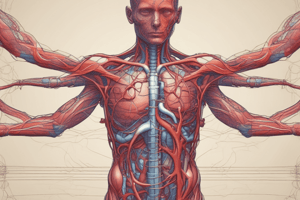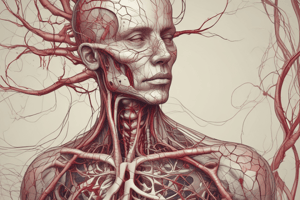Podcast
Questions and Answers
What is the function of arteries?
What is the function of arteries?
- Carry blood away from the heart and toward capillaries (correct)
- Carry blood from the arterioles to the venules
- Transport blood between the lungs and the heart
- Carry blood toward the heart and away from capillaries
What is the primary function of veins?
What is the primary function of veins?
- Carry blood toward the heart and away from capillaries (correct)
- Carry blood from the arterioles to the venules
- Carry blood away from the heart and toward capillaries
- Transport blood between the lungs and the heart
What is the role of capillaries in the circulatory system?
What is the role of capillaries in the circulatory system?
- Carry blood away from the heart and toward capillaries
- Carry blood toward the heart and away from capillaries
- Carry blood from the arterioles to the venules (correct)
- Transport blood between the lungs and the heart
Which vessels transport blood between the lungs and the heart?
Which vessels transport blood between the lungs and the heart?
What is the definition of pulse?
What is the definition of pulse?
What is the major cause of hypovolemic shock?
What is the major cause of hypovolemic shock?
What is the classification of hypertension (HTN) when blood pressure exceeds 140/90 mm Hg?
What is the classification of hypertension (HTN) when blood pressure exceeds 140/90 mm Hg?
What causes neurogenic shock?
What causes neurogenic shock?
What is the effect of septic shock on blood vessels?
What is the effect of septic shock on blood vessels?
What influences pressure in large peripheral veins?
What influences pressure in large peripheral veins?
What is the major risk factor for hypertension (HTN)?
What is the major risk factor for hypertension (HTN)?
What is the definition of blood viscosity?
What is the definition of blood viscosity?
What are the components of arteries?
What are the components of arteries?
What is the function of veins?
What is the function of veins?
What do capillaries serve as?
What do capillaries serve as?
What are common disorders of arteries?
What are common disorders of arteries?
What can be used to manage arterial disorders?
What can be used to manage arterial disorders?
What are potential disorders of arteries?
What are potential disorders of arteries?
What are common disorders of veins?
What are common disorders of veins?
What does systemic circulation do?
What does systemic circulation do?
What is the function of hepatic portal circulation?
What is the function of hepatic portal circulation?
What does fetal circulation involve?
What does fetal circulation involve?
What factors influence blood pressure?
What factors influence blood pressure?
Flashcards are hidden until you start studying
Study Notes
Anatomy and Function of Blood Vessels
- Arteries consist of tunica intima, tunica media, and tunica externa; they distribute nutrients and gases, regulate blood pressure, and serve as reservoirs
- Veins have tunica intima, tunica media, and tunica externa; they collect blood for return to the heart, with valves preventing retrograde movement
- Capillaries serve as exchange vessels for nutrients, wastes, and fluids
- Arteriosclerosis and atherosclerosis are common disorders of arteries, leading to reduced blood flow and potential ischemia
- Balloon angioplasty and vasodilators can be used to manage arterial disorders
- Aneurysm, thrombosis, and stroke are potential disorders of arteries
- Varicose veins, hemorrhoids, and thrombophlebitis are common disorders of veins
- Systemic circulation carries blood throughout the body, while pulmonary circulation carries blood to and from the lungs
- Hepatic portal circulation is a unique blood route through the liver, assisting in homeostasis of blood glucose levels
- Fetal circulation involves unique structures like the placenta, umbilical arteries and vein, ductus venosus, ductus arteriosus, and foramen ovale
- Changes to fetal circulation occur at birth, involving the closure of specialized fetal blood vessels
- Blood pressure is the force of blood in the blood vessels, with factors like blood volume, heart contractions, and heart rate influencing it
Studying That Suits You
Use AI to generate personalized quizzes and flashcards to suit your learning preferences.




